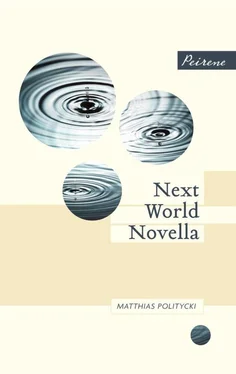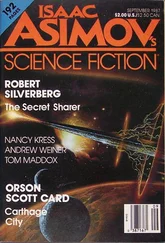Matthias Politycki - Next World Novella
Здесь есть возможность читать онлайн «Matthias Politycki - Next World Novella» весь текст электронной книги совершенно бесплатно (целиком полную версию без сокращений). В некоторых случаях можно слушать аудио, скачать через торрент в формате fb2 и присутствует краткое содержание. Год выпуска: 2011, Издательство: Peirene, Жанр: Современная проза, на английском языке. Описание произведения, (предисловие) а так же отзывы посетителей доступны на портале библиотеки ЛибКат.
- Название:Next World Novella
- Автор:
- Издательство:Peirene
- Жанр:
- Год:2011
- ISBN:нет данных
- Рейтинг книги:4 / 5. Голосов: 1
-
Избранное:Добавить в избранное
- Отзывы:
-
Ваша оценка:
- 80
- 1
- 2
- 3
- 4
- 5
Next World Novella: краткое содержание, описание и аннотация
Предлагаем к чтению аннотацию, описание, краткое содержание или предисловие (зависит от того, что написал сам автор книги «Next World Novella»). Если вы не нашли необходимую информацию о книге — напишите в комментариях, мы постараемся отыскать её.
Hinrich takes his existence at face value. His wife, on the other hand, has always been more interested in the after-life. Or so it seemed. When she dies of a stroke, Hinrich goes through her papers, only to discover a totally different perspective on their marriage. Thus commences, a dazzling intellectual game of shifting realities.
Next World Novella — читать онлайн бесплатно полную книгу (весь текст) целиком
Ниже представлен текст книги, разбитый по страницам. Система сохранения места последней прочитанной страницы, позволяет с удобством читать онлайн бесплатно книгу «Next World Novella», без необходимости каждый раз заново искать на чём Вы остановились. Поставьте закладку, и сможете в любой момент перейти на страницу, на которой закончили чтение.
Интервал:
Закладка:
After that he dreamt of the sign at night. When Doro regarded him inquiringly during the day he looked down at the floor, ashamed. What could he have said to her? That evening an extraordinary thing had occurred in his life, a life that so far had known only an extraordinary absence of experience. From then on he kept a frequent eye on the scene of this event to see if there would be a sequel. Oh, he had no ambitions of his own; it would only have been a case of looking, of participating in something he imagined as the simultaneous height of depravity and of bliss.
The devotion he had always received at home now became almost like a burden. He avoided it as much as he could. Yet it was Doro who solved the puzzle of the tattoo: as he sat in her room one afternoon at their usual time with a pot of green tea, his eye fell on the sign quite by chance. There it was among the other sixty-three signs of the I Ching; Doro had hung them on the wall here as well. Schepp stood right in front it; he couldn’t possibly miss it. How beautiful it was when written by a master of calligraphy! He immediately asked Doro whether he could borrow one of her commentaries, if possible the Southern Commentaries, if she could spare the book. Doro raised an eyebrow in surprise. But how could he have explained himself?
Having found the sign and studied it almost daily, his peace of mind was definitely gone. The unknown woman, however, stood him up evening after evening, though he became a regular at the bar, exchanging banter with this or that member of the staff. Paul, the manager, a jovial soul in his late forties with a well-tended moustache, known to everyone as Paulus, would greet him with, ‘Evening, Professor, doing okay, are we?’ Paulus spent most of the evening behind the bar, an equable presence washing up glasses as if the goings-on were beneath his notice. La Pfiff was not plugged into the cultured bohemian milieu of the digital age; customers came in and either backed straight out again or didn’t leave until hours later. By midnight everyone had both argued and fraternized with everyone else. In his own fashion, anyway, Schepp became part of it.
It was useful that La Pfiff was within walking distance of his apartment. The regular course of his days now gave way to an irregularity that in the end became routine, although it was the opposite of the former kind. Hitherto a man of the old school who combed his remaining hair over his bald patch and vacillated between melancholy and megalomania, Schepp took to shaving his head, chose colourful handkerchiefs for his breast pocket, bought stronger aftershave, gained a certain authority with the occasional clever quibble that earned him a laugh — oh, he was tired of his reasonable mind. He hardly did any research; soon he wasn’t even publishing, and there was an admixture of mockery in the respectful empathy he now encountered from his full-time colleagues at the University. He once even overheard someone calling him Professor Unrat, after the nickname — Professor Garbage — of Professor Raat, the protagonist of Heinrich Mann’s novel. What did PhD students know about anything anyway? He also, and for the first time, offered an introductory course on the I Ching, much to the surprise of Doro, whom he now only ever saw when they drank tea together in the afternoon.
It could probably have gone on like this for ever. But then she reappeared — the woman of whom he thought every day with a shiver of admiration. Schepp had long given up any hope of seeing her again, but when he entered La Pfiff one evening he almost stumbled into her. There was no doubt, it was definitely her. With that Chinese character tattooed on her throat she was unmistakably branded. For a Sinologist, that was not a coincidence, but had been arranged by Fate especially for him, the only one there who understood the sign. She was standing at the bar with a tray in her hands on which Paulus was placing a round of drinks. She had come back.
This time to work as a waitress.
Her name was Dana, and she was from Poland ‘or somewhere in the east’. Paulus knew almost nothing about her. No, he couldn’t remember ever having seen her at La Pfiff before. Or if he did he wasn’t saying, and Schepp was careful not to mention it. For the rest of the evening he watched her as casually as he could; he was bound to glance at a new waitress now and then. Once more their eyes met briefly, once more hers rested on him without any interest. When she served him she even asked the same question she had asked at the table next to his:
Where had a nice lad like him left his girlfriend this evening?
Schepp gulped down the contents of his glass so that he could order another drink quickly. This time he asked her straight out about her tattoo, saying he had seen her here in the summer, he was certain that he knew her.
In her charming accent Dana replied that she knew him and his sort too, and particularly that trick; he’d have to think up something subtler.
‘Oh, please!’ objected Schepp. It wasn’t like that at all, as a Sinologist he must protest, he’d have known a sign like the one on her neck with his eyes closed! He would in fact have liked to have leapt to his feet and bitten her right on that spot. He didn’t say that, of course. Instead he asked whether she knew what a fateful mark she was carrying, an oracular pronouncement of which Kung Tze himself had said –
This was too subtle for her, said Dana, turning away.
Schepp sat there red-faced for the rest of the evening, not sure whether he should feel more offended as a man or as an academic. Even now, years later, he was overcome by embarrassment when he conjured up the scene; he ought really to have given Dana a slap in the face there and then, and that would have been that. Especially when he thought of her scent, some cheap Polish perfume that gave her an improper air, as if both the perfume and the woman were cheap and available.
He shook himself, pulled a face, as if his room, too, were full of Dana’s objectionable perfume. He certainly wasn’t going to think about that today. It was highly unsuitable, and damn it all, he had thought of that woman Dana far too often, thought of her every day. Every night. Well? Did that make him a worse human being, a worse husband; hadn’t he always lavished care and attention on Doro? Although, even so, it was a long time, yes, a very long time since he had actually touched her.
Good God, it happened to so many men, it didn’t have to mean anything.
Schepp forced himself back to the present. How long had he been kneeling in front of Doro? I always loved you, you know I did.
But you don’t know about Dana, he thought, getting up with difficulty. His knees hurt. He stepped away from Doro and the chaise-longue . He had always thought that she had known nothing about all that, nothing at all. And in actual fact it really hadn’t been anything more than a few rather unseemly passing thoughts. Why had he lapsed into thinking about Dana today, anyway? Shaking his head, Schepp set off along the fishbone pattern of the parquet. How could he be recalling such a person in the presence of death? How she repelled him in retrospect, how he despised her, how he hated her!
His right hand beat time in the air to his muttered exclamations of annoyance, index and little fingers extended, the rest of his hand clenched into a fist. Until he remembered why he had thought of Dana, whereupon his hand stopped in mid-air and dropped powerlessly to his side. It was Doro’s own fault! There was a sudden rushing in his ears as if the ground were about to give way beneath him. As he clung to his desk, however, his sense of equilibrium was restored. After he had said out loud several times that Dana was really, really entirely different from Hanni, you could almost say her opposite — surely that was obvious, he hoped that showed once and for all how absurd Doro’s corrections were — he remembered what his initial intention had been. Wasn’t he going to keep a vigil at Doro’s side? Wasn’t this his chance to read her final message? He had to continue the reading, never mind Hanni, never mind Dana.
Читать дальшеИнтервал:
Закладка:
Похожие книги на «Next World Novella»
Представляем Вашему вниманию похожие книги на «Next World Novella» списком для выбора. Мы отобрали схожую по названию и смыслу литературу в надежде предоставить читателям больше вариантов отыскать новые, интересные, ещё непрочитанные произведения.
Обсуждение, отзывы о книге «Next World Novella» и просто собственные мнения читателей. Оставьте ваши комментарии, напишите, что Вы думаете о произведении, его смысле или главных героях. Укажите что конкретно понравилось, а что нет, и почему Вы так считаете.












